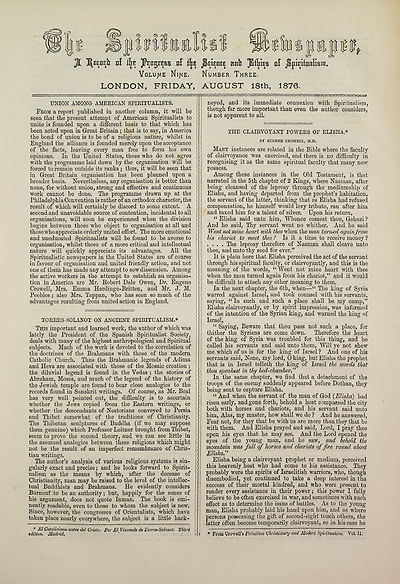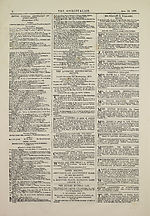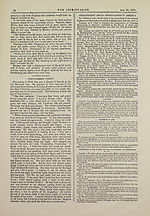Download files
Complete book:
Individual page:
Thumbnail gallery: Grid view | List view

J[ of j|« I’jjojr^ss of % atth of jljmjtlmtftottt.
VotujviE Kij^e* Number Three.
LONDON, FRIDAY, AUGUST 18th, 1876.
UNION AMONG AMERICAN SPIRITUALISTS.
From a report published in another column, it will be I
seen that the present attempt of American Spiritualists to j
unite is founded upon a different basis to that which has !
been acted upon in Great Britain ; that is to say, in America j
the bond of union is to be of a religious nature, whilst in !
England the alliance is founded merely upon the acceptance j
of the facts, leaving every man free to form his own ;
opinions. In the United States, those who do not agree j
with the programme laid down by the organisation will be j
forced to remain outside its ranks ; thus, it will be seen that j
in Great Britain organisation has been planned upon a j
broader basis. Nevertheless, any organisation is better than |
none, for without union, strong and effective and continuous j
work cannot be done. The programme drawn up at the |
Philadelphia Convention is rather of an orthodox character, the j
result of which will certainly be discord to some extent. A j
second and unavoidable source of contention, incidental to all j
organisations, will soon be experienced when the division |
begins between those who object to organisation at all and I
those who appreciate orderly united effort. The more emotional
and uneducated Spiritualists will be found to be averse to j
organisation, whilst those of a more critical and intellectual j
nature will quickly appreciate its advantages. All the j
Spiritualistic newspapers in the United States are of course |
in favour of organisation and united friendly action, and not j
one of them has made any attempt to sow dissension. Among j
the active workers in the attempt to establish an organisa- j
tion in America are Mr. Robert Dale Owen, Dr. Eugene j
Crowell, Mrs. Emma Hardinge-Britten, and Mr. J. M. j
Peebles; also Mrs. Tappan, who has seen so much of the |
advantages resulting from united action in England.
TORRES-SOLANOT ON ANCIENT SPIRITUALISM.*
This important and learned work, the author of which was | j j
lately the President of the Spanish Spiritualist Society, j j
deals with many of the highest anthropological and Spiritual i j j
subjects. Much of the work is devoted to the correlation of j j j
the doctrines of the Brahmans with those of the modern j j j
Catholic Church. Thus the Brahmanic legends of Adima j j j
and Heva are associated with those of the Mosaic creation; j j j
the diluvial legend is found in the Vedas ; the stories of j[j
Abraham, Moses, and much of the legend of the history of j,
the Jewish temple are found to bear close analogies to the ! j
records found in Sanskrit writings. Of course, as Mr. Beal | j j
has very well pointed out, the difficulty is to ascertain j j j
whether the Jews copied from the Eastern writings, or
whether the descendants of Nestorians conveyed to Persia j j j
and Thibet somewhat of the traditions of Christianity. j(j
The Thibetan sculptures of Buddha (if we may suppose jj j
them genuine) which Professor Leitner brought from Thibet, j j j
seem to prove the second theory, and we can see little in jjj
the assumed analogies between these religions which might j j j
not be the result of an imperfect remembrance of Chris- jjj
tian writings. j j j
The author’s analysis of various religious systems is sin- j j j
gularly exact and precise; and he looks forward to Spirit- j j i
ualism as the means by which, after the decease of jjj
Christianity, man may be raised to the level of the intellec- j j j
tual Buddhists and Brahmans. He evidently considers jjj
Burnouf to be an authority; but, happily for the sense of j j j
his argument, does not quote Inman. The book is emi- ||j
nently readable, even to those to whom the subject is new. j j j
Since, however, the congresses of Orientalists, which have jjj
taken place nearly everywhere, the subject is a little hack- j j j
* El Catolicismo antes del Cristo. For El Vixconde de Tones^Solanot, Third j \ j
edition. Madrid, . ' ... i(i
neyed, and its immediate connexion with Spiritualism,
though far more important than even the author considers,
is not apparent to all.
THE CLAIRVOYANT POWERS OF ELISHA *
BT EUGENE CBOWELL, M.D.
Many instances are related in the Bible where the faculty
of clairvoyance was exercised, and there is no difficulty in
recognising it as the same spiritual faculty that many now
possess.
Among these instances in the Old Testament, is that
narrated in the 5th chapter of 2 Kings, where Naaman, after
being cleansed of the leprosy through the medium ship of
Elisha, and having departed from the prophet’s habitation,
the servant of the latter, thinking that as Elisha had refused
compensation, he himself would levy tribute, ran after him
and taxed him for a talent of silver. Upon his return,
“ Elisha said unto him, Whence comest thou, Gehazi ?
And he said, Thy servant went no whither. And he said
Went not mine heart with thee when the man turned again from,
his chariot to meet thee ? Is it a time to receive money ?
.... The leprosy therefore of Naaman shall cleave unto
thee, and unto thy seed for ever.”
It is plain here that Elisha perceived the act of the servant
through his spiritual faculty, or clairvoyantly, and this is the
meaning of the words, <(Went not mine heart with thee
when the man turned again from his chariot,” and it would
be difficult to attach any other meaning to them.
In the next chapter, the 6th, when—“ The king of Syria
warred against Israel, and took counsel with his servants,
saying, “ In such and such a place shall be my camp,”
Elisha clairvoyantly, or by spirit impression, was informed
of the intention of the Syrian king, and warned the king of
Israel,
<( Saying, Beware that thou pass not such a place, for
thither the Syrians are come down. Therefore the heart
of the king of Syria was troubled for this thing, and he
called his servants and said unto them, Will ye not shew
me which of us is for the king of Israel ? And one of his
servants said, None, my lord, 0 king, but Elisha the prophet
that is in Israel telleth the king of Israel the words that
thou speakest in thy bed-chamber.”
In the same chapter, we find that a detachment of the
troops of the enemy suddenly appeared before Dothan, they
being sent to capture Elisha.
“ And when the servant of the man of God {Elisha) had
risen early, and gone forth, behold a host compassed the city
both with horses and chariots, and his servant said unto
him, Alas, my master, how shall we do ? And he answered,
Fear not, for they that be with us are more than they that be
with them. And Elisha prayed and said, Lord, I pray thee
open his eyes that he may see. And the Lord opened the
eyes of the young man, and he saw, and behold the
mountain was full of horses and chariots of fire round about
Elisha”
Elisha being a clairvoyant prophet or medium, perceived
this heavenly host who had come to his assistance. They
probably were the spirits of Israelitish warriors, who, though
disembodied, yet continued to take a deep interest in the
success of their mortal kindred, and who were present to
render every assistance in their power; this power I fully
believe to be often exercised in war, and sometimes with such
effect as to determine the issue of battles. As to the young
man, Elisha probably laid his hand upon him, and as where
persons possessing the gift of second-sight touch others, the
latter often become temporarily clairvoyant, so in his case he
* From CroKyell’s Piimitive Christianity and Modern Spiritual,m, Yol, II.
VotujviE Kij^e* Number Three.
LONDON, FRIDAY, AUGUST 18th, 1876.
UNION AMONG AMERICAN SPIRITUALISTS.
From a report published in another column, it will be I
seen that the present attempt of American Spiritualists to j
unite is founded upon a different basis to that which has !
been acted upon in Great Britain ; that is to say, in America j
the bond of union is to be of a religious nature, whilst in !
England the alliance is founded merely upon the acceptance j
of the facts, leaving every man free to form his own ;
opinions. In the United States, those who do not agree j
with the programme laid down by the organisation will be j
forced to remain outside its ranks ; thus, it will be seen that j
in Great Britain organisation has been planned upon a j
broader basis. Nevertheless, any organisation is better than |
none, for without union, strong and effective and continuous j
work cannot be done. The programme drawn up at the |
Philadelphia Convention is rather of an orthodox character, the j
result of which will certainly be discord to some extent. A j
second and unavoidable source of contention, incidental to all j
organisations, will soon be experienced when the division |
begins between those who object to organisation at all and I
those who appreciate orderly united effort. The more emotional
and uneducated Spiritualists will be found to be averse to j
organisation, whilst those of a more critical and intellectual j
nature will quickly appreciate its advantages. All the j
Spiritualistic newspapers in the United States are of course |
in favour of organisation and united friendly action, and not j
one of them has made any attempt to sow dissension. Among j
the active workers in the attempt to establish an organisa- j
tion in America are Mr. Robert Dale Owen, Dr. Eugene j
Crowell, Mrs. Emma Hardinge-Britten, and Mr. J. M. j
Peebles; also Mrs. Tappan, who has seen so much of the |
advantages resulting from united action in England.
TORRES-SOLANOT ON ANCIENT SPIRITUALISM.*
This important and learned work, the author of which was | j j
lately the President of the Spanish Spiritualist Society, j j
deals with many of the highest anthropological and Spiritual i j j
subjects. Much of the work is devoted to the correlation of j j j
the doctrines of the Brahmans with those of the modern j j j
Catholic Church. Thus the Brahmanic legends of Adima j j j
and Heva are associated with those of the Mosaic creation; j j j
the diluvial legend is found in the Vedas ; the stories of j[j
Abraham, Moses, and much of the legend of the history of j,
the Jewish temple are found to bear close analogies to the ! j
records found in Sanskrit writings. Of course, as Mr. Beal | j j
has very well pointed out, the difficulty is to ascertain j j j
whether the Jews copied from the Eastern writings, or
whether the descendants of Nestorians conveyed to Persia j j j
and Thibet somewhat of the traditions of Christianity. j(j
The Thibetan sculptures of Buddha (if we may suppose jj j
them genuine) which Professor Leitner brought from Thibet, j j j
seem to prove the second theory, and we can see little in jjj
the assumed analogies between these religions which might j j j
not be the result of an imperfect remembrance of Chris- jjj
tian writings. j j j
The author’s analysis of various religious systems is sin- j j j
gularly exact and precise; and he looks forward to Spirit- j j i
ualism as the means by which, after the decease of jjj
Christianity, man may be raised to the level of the intellec- j j j
tual Buddhists and Brahmans. He evidently considers jjj
Burnouf to be an authority; but, happily for the sense of j j j
his argument, does not quote Inman. The book is emi- ||j
nently readable, even to those to whom the subject is new. j j j
Since, however, the congresses of Orientalists, which have jjj
taken place nearly everywhere, the subject is a little hack- j j j
* El Catolicismo antes del Cristo. For El Vixconde de Tones^Solanot, Third j \ j
edition. Madrid, . ' ... i(i
neyed, and its immediate connexion with Spiritualism,
though far more important than even the author considers,
is not apparent to all.
THE CLAIRVOYANT POWERS OF ELISHA *
BT EUGENE CBOWELL, M.D.
Many instances are related in the Bible where the faculty
of clairvoyance was exercised, and there is no difficulty in
recognising it as the same spiritual faculty that many now
possess.
Among these instances in the Old Testament, is that
narrated in the 5th chapter of 2 Kings, where Naaman, after
being cleansed of the leprosy through the medium ship of
Elisha, and having departed from the prophet’s habitation,
the servant of the latter, thinking that as Elisha had refused
compensation, he himself would levy tribute, ran after him
and taxed him for a talent of silver. Upon his return,
“ Elisha said unto him, Whence comest thou, Gehazi ?
And he said, Thy servant went no whither. And he said
Went not mine heart with thee when the man turned again from,
his chariot to meet thee ? Is it a time to receive money ?
.... The leprosy therefore of Naaman shall cleave unto
thee, and unto thy seed for ever.”
It is plain here that Elisha perceived the act of the servant
through his spiritual faculty, or clairvoyantly, and this is the
meaning of the words, <(Went not mine heart with thee
when the man turned again from his chariot,” and it would
be difficult to attach any other meaning to them.
In the next chapter, the 6th, when—“ The king of Syria
warred against Israel, and took counsel with his servants,
saying, “ In such and such a place shall be my camp,”
Elisha clairvoyantly, or by spirit impression, was informed
of the intention of the Syrian king, and warned the king of
Israel,
<( Saying, Beware that thou pass not such a place, for
thither the Syrians are come down. Therefore the heart
of the king of Syria was troubled for this thing, and he
called his servants and said unto them, Will ye not shew
me which of us is for the king of Israel ? And one of his
servants said, None, my lord, 0 king, but Elisha the prophet
that is in Israel telleth the king of Israel the words that
thou speakest in thy bed-chamber.”
In the same chapter, we find that a detachment of the
troops of the enemy suddenly appeared before Dothan, they
being sent to capture Elisha.
“ And when the servant of the man of God {Elisha) had
risen early, and gone forth, behold a host compassed the city
both with horses and chariots, and his servant said unto
him, Alas, my master, how shall we do ? And he answered,
Fear not, for they that be with us are more than they that be
with them. And Elisha prayed and said, Lord, I pray thee
open his eyes that he may see. And the Lord opened the
eyes of the young man, and he saw, and behold the
mountain was full of horses and chariots of fire round about
Elisha”
Elisha being a clairvoyant prophet or medium, perceived
this heavenly host who had come to his assistance. They
probably were the spirits of Israelitish warriors, who, though
disembodied, yet continued to take a deep interest in the
success of their mortal kindred, and who were present to
render every assistance in their power; this power I fully
believe to be often exercised in war, and sometimes with such
effect as to determine the issue of battles. As to the young
man, Elisha probably laid his hand upon him, and as where
persons possessing the gift of second-sight touch others, the
latter often become temporarily clairvoyant, so in his case he
* From CroKyell’s Piimitive Christianity and Modern Spiritual,m, Yol, II.
Set display mode to:
![]() Universal Viewer |
Universal Viewer | ![]() Mirador |
Large image | Transcription
Mirador |
Large image | Transcription
Images and transcriptions on this page, including medium image downloads, may be used under the Creative Commons Attribution 4.0 International Licence unless otherwise stated. ![]()
| The Spiritualist > The Spiritualist newspaper > No.208, August 18th 1876 > (3) |
|---|
| Permanent URL | https://digital.nls.uk/137183053 |
|---|
| Attribution and copyright: |
|
|---|---|
| Shelfmark | P.20 |
|---|---|
| Additional NLS resources: |

